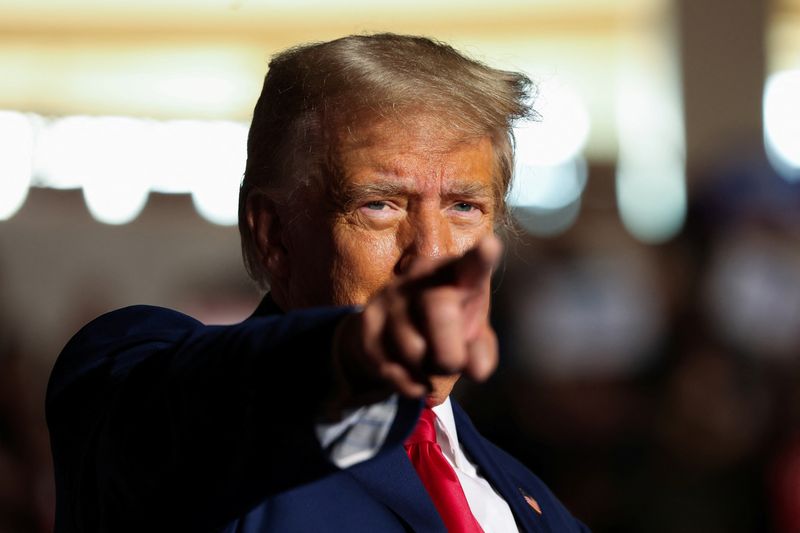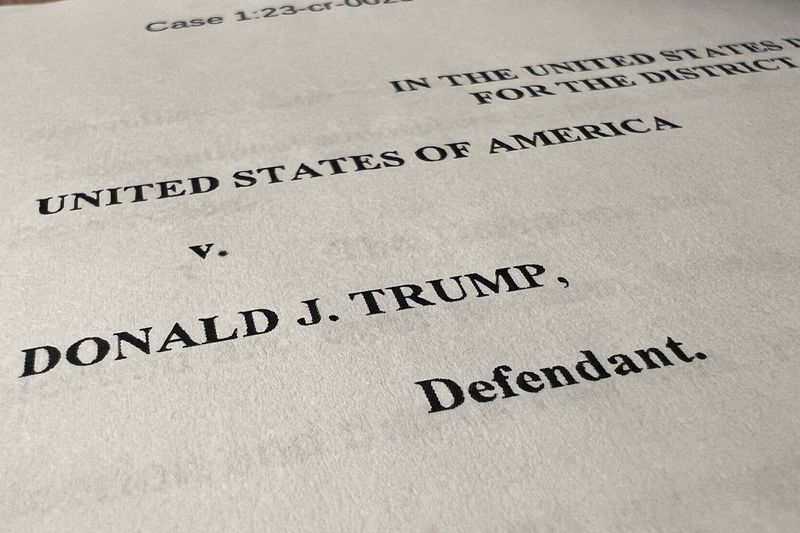By Jack Queen and Sarah N. Lynch
(Reuters) - A law enacted in the aftermath of the U.S. Civil War to protect the rights of Black people factors into the charges brought against former President Donald Trump on Tuesday in a federal election interference case.
Trump, the front-runner for the 2024 Republican nomination, was charged with conspiring to deprive voters of their right to a fair election and defraud the U.S. by blocking Congress from certifying President Joe Biden's victory. He has denied wrongdoing and said the case is part of a broader, politically motivated "witch hunt."
Federal prosecutors base one charge, conspiring to deprive citizens of constitutional or legal rights, on a law enacted during post-Civil War Reconstruction in 1870, when federal lawmakers sought to integrate into society enslaved people who had been freed.
Kristy Parker, a former federal prosecutor, said many efforts by Trump and his allies to overturn the election targeted urban areas with large populations of Black voters who voted for Democrat Joe Biden.
Those included Atlanta, Detroit and Philadelphia.
“It’s pretty telling that those Reconstruction-era laws would apply to this case, and it suggests that we are fighting a lot of the same battles that we were fighting in the Civil War," said Parker, an attorney at the non-profit advocacy group Protect Democracy.
The Reconstruction era lasted until 1877 but is widely considered a failure by historians, in part because it neither prevented violence against Black people nor delivered lasting racial integration in politics and civil society.
But battling violence against Black people was a central goal of the deprivation of rights statute, and it has long been used to prosecute hate crimes.
It was central to the 1967 trial of more than a dozen Ku Klux Klan members who conspired to murder three civil rights workers, a case immortalized in the 1988 film "Mississippi Burning."
Prosecutors have long used the deprivation of rights statute, known as Section 241, to fight disenfranchisement of Black voters, and a string of landmark U.S. Supreme Court cases have affirmed the law's use for that purpose.
The law also covers less overt schemes to disenfranchise voters. In March, a Brooklyn federal jury convicted a social media influencer of deprivation of rights for targeting supporters of Democrat Hillary Clinton, Trump's rival in the 2016 election, with false information about how to vote. The scheme explicitly targeted Black voters.
Trump is accused of using false claims of voter fraud to pressure election officials to subvert the election and conspiring with others to put forth a slate of sham electors who would falsely deem him the winner.
Legal experts said Trump's alleged conduct clearly falls within Section 241, which is broadly written.
“From a prosecution standpoint, I think the charge is a solid one that is well-grounded in what Congress envisioned when they passed this statute,” said Eric Gibson, a former federal prosecutor who successfully prosecuted a former Pennsylvania election judge and a former U.S. Congressman for trading bribes for fraudulent votes.
To prevail against Trump, prosecutors must prove he conspired with at least one other person to deprive voters of their right to a fair election, regardless of whether he was successful.
The indictment accused Trump and co-conspirators of organizing fraudulent slates of electors in seven states, all of which he lost, to submit their votes to be counted and certified as official by Congress on Jan. 6.
Trump could argue that he is innocent because he did not intend to break the law. He has claimed without evidence that the 2020 election was tainted by fraud and said his actions were aimed at safeguarding the vote.
The issue will likely be subject to intense pretrial litigation and legal wrangling if the case goes to trial.

But even if prosecutors have a strong legal case, Trump would need just one holdout juror to trigger a mistrial. Given the politically fraught nature of the case, that would likely be prosecutors’ biggest concern ahead of a trial - and make the jury selection process critical to the outcome.
“The danger here is that they get someone on the jury who is there for political reasons,” Gibson said. “Trump’s team can’t just insert people into the jury, but the reality is that almost half the country voted for him.”
